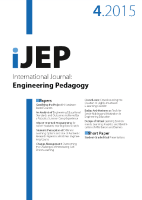
International Journal of Engineering Pedagogy
Scope & Guideline
Driving Excellence in Engineering Education and Research
Introduction
Aims and Scopes
- Innovative Teaching Methodologies:
The journal explores various innovative teaching methods such as project-based learning, problem-based learning, and gamification to improve student outcomes in engineering education. - Integration of Technology in Education:
A core focus is on the integration of advanced technologies such as augmented reality, artificial intelligence, and online learning platforms to enhance the educational experience for engineering students. - Student-Centered Learning Approaches:
Research published in the journal emphasizes student engagement through collaborative and active learning strategies, aiming to foster critical thinking, creativity, and problem-solving skills among students. - Sustainability and Ethical Considerations:
The journal addresses the importance of sustainability in engineering education, promoting curricula that incorporate environmental awareness and ethical considerations in engineering practices. - Assessment and Evaluation Methods:
It investigates various assessment strategies, including formative and summative assessments, to gauge student learning and the effectiveness of teaching methods in engineering disciplines.
Trending and Emerging
- Use of Artificial Intelligence and Machine Learning:
Recent studies focus on the application of AI and machine learning in educational contexts, exploring their potential to enhance learning outcomes and personalize the educational experience for engineering students. - Gamification and Game-Based Learning:
There is an increasing interest in gamification as a strategy to foster student engagement and motivation, with several papers investigating its effectiveness in various engineering courses. - Hybrid and Online Learning Models:
The journal is seeing a surge in research related to hybrid and online learning models, particularly in response to the COVID-19 pandemic, which has reshaped educational delivery methods. - Sustainable Engineering Education:
Emerging themes focus on integrating sustainability principles into engineering curricula, preparing students to address global challenges such as climate change and resource management. - Collaborative Learning Environments:
Recent publications emphasize the importance of collaborative learning environments that leverage technology to facilitate peer interaction and teamwork among engineering students.
Declining or Waning
- Traditional Lecture-Based Learning:
The journal has published fewer papers emphasizing traditional lecture-based approaches, indicating a shift towards more interactive and student-centered learning environments. - Conventional Assessment Techniques:
There is a noticeable decline in the discussion of conventional assessment methods, such as standardized testing, as the focus moves towards more dynamic and formative assessment strategies. - Disciplinary Silos in Engineering Education:
Papers that focus solely on specific engineering disciplines without interdisciplinary approaches are becoming less common, reflecting a trend towards integrated and holistic educational frameworks. - Static Curriculum Frameworks:
Research on static or rigid curriculum designs is decreasing, as the emphasis shifts towards adaptive and flexible curricula that respond to changing industry demands and student needs. - Limited Focus on Non-Technical Skills:
There is a reduced emphasis on non-technical skills, such as soft skills training, in engineering education discussions, suggesting a need to re-integrate these important competencies into the curriculum.
Similar Journals
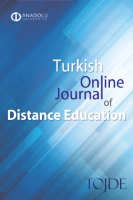
Turkish Online Journal of Distance Education
Advancing Innovations in Online Education.Turkish Online Journal of Distance Education, a distinguished publication from ANADOLU UNIVERSITY, serves as a vital resource in the field of distance education, contributing significantly to the ongoing discourse since its inception in 2000. With an impressive impact factor that reflects its standing within the academic community, this open access journal provides an influential platform for researchers, educators, and practitioners to disseminate innovative findings and educational strategies. Ranked in the Q2 category within the education sector according to the 2023 quartile rankings, and boasting a commendable position of #423 out of 1543 in Scopus' Social Sciences Education rankings, the journal places itself firmly within the 72nd percentile of its cohort. Spanning from 2004 to 2024, the journal's commitment to advancing scholarship in distance education is reflected not only in its comprehensive articles but also in its responsive engagement with contemporary educational challenges. Positioned in Eskişehir, Turkey, this journal aims to elevate discussions surrounding online learning and contributes to the global dialogue on education accessibility and innovation.
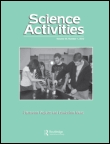
Science Activities-Projects and Curriculum Ideas in STEM Classrooms
Catalyzing Change: Innovative Strategies for STEM ClassroomsScience Activities-Projects and Curriculum Ideas in STEM Classrooms is a distinguished journal published by Routledge Journals, Taylor & Francis Ltd, prominently addressing the critical need for innovative teaching methodologies in the realms of Science, Technology, Engineering, and Mathematics (STEM). With an ISSN of 0036-8121 and an E-ISSN of 1940-1302, this journal serves as a vital resource for educators, researchers, and curriculum developers who are dedicated to enhancing STEM education through practical activities and project-based learning. Although it is not an open access publication, it offers invaluable insights that foster engagement and deepen understanding of STEM concepts in classroom environments. By publishing diverse articles that blend theory with practice, Science Activities aims to inspire educators to implement engaging curriculum ideas that not only promote scientific literacy but also cater to diverse learning styles. This journal is an essential companion for anyone invested in shaping the future of STEM education, providing a platform for exchanging innovative ideas and strategies that can be directly applied in the classroom.

Pegem Egitim ve Ogretim Dergisi
Exploring Innovative Pedagogies in EducationPegem Egitim ve Ogretim Dergisi is a prominent academic journal published by PEGEM AKAD YAYINCILIK EGITIM DANISMANLIK HIZMETLERI TIC LTD STI, specializing in the field of education. Based in Turkey, this journal offers a platform for scholarly discourse, catering to both emerging and established researchers in the educational domain. With its ISSN 2148-239X, the journal aims to provide insights into contemporary educational practices, pedagogical innovations, and research findings that influence teaching and learning. Although classified in the Q4 quartile of the education category as of 2022 and achieving a Scopus rank of 1178 out of 1469, it remains a valuable resource for practitioners and academics alike. The journal ceased Scopus coverage in 2023, yet it continues to be a relevant outlet for educational research in Turkey and beyond. While it operates under traditional access models, the potential for collaborative research and knowledge sharing makes it a noteworthy choice for those engaged in the evolving landscape of education.

TEACHING OF PSYCHOLOGY
Enhancing Learning Journeys in the World of PsychologyTEACHING OF PSYCHOLOGY is a distinguished academic journal published by SAGE Publications Ltd, focusing on the field of psychology education. Established in 1975, this journal has carved out a vital niche in the academic landscape, facilitating the dissemination of innovative teaching practices, research outcomes, and pedagogical strategies that enhance the learning experience in psychology. With an impressive H-index indicating its influence, TEACHING OF PSYCHOLOGY is ranked in the second quartile for Education and third quartile for Psychology (Miscellaneous) in 2023, reflecting its pivotal role in these fields. The journal boasts a robust Scopus ranking, placing it within the 55th percentile for Social Sciences - Education and the 42nd percentile for General Psychology, demonstrating its relevance and reach among scholars and practitioners alike. Although it does not offer open access, it remains a crucial resource for educators, researchers, and students seeking to enhance their understanding and application of psychological principles in educational settings. By contributing to the ongoing dialogue about effective teaching methodologies in psychology, the journal aims to inspire and inform educators, fostering an environment of rigorous academic inquiry and practical application.
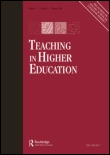
TEACHING IN HIGHER EDUCATION
Elevating scholarship on teaching and learning in higher education.TEACHING IN HIGHER EDUCATION is a premier academic journal published by Routledge Journals, Taylor & Francis Ltd, dedicated to advancing the scholarship and practice of teaching within the higher education sector. With an ISSN of 1356-2517 and an E-ISSN of 1470-1294, this journal is widely recognized for its profound impact in the field, boasting a 2023 category rank of Q1 in Education, placing it in the top tier of educational research. Its commitment to fostering an inclusive and dynamic discourse on pedagogical methods and learning frameworks makes it essential reading for researchers, educators, and policymakers alike. Spanning topics such as student engagement, curriculum development, and innovative teaching strategies, TEACHING IN HIGHER EDUCATION aims to contribute to ongoing conversations and practical applications that enhance the educational landscape. While an Open Access option is not available, the journal maintains a robust readership, with its articles being rigorously peer-reviewed and disseminated to reflect cutting-edge research trends and practices in education.

Technology Knowledge and Learning
Empowering Educators with Cutting-edge InsightsTechnology Knowledge and Learning, published by SPRINGER, stands as a pivotal platform in the realms of computational theory, computer science, education, and human-computer interaction. With an impressive impact factor reflecting its reputation, this journal has consistently ranked in the Q1 quartile across multiple categories as of 2023, including Computational Theory and Mathematics, Education, and Engineering. Spanning a timeline from 2011 to 2024, it serves as an essential resource for those engaged in exploring the intersections of technology, pedagogy, and knowledge transfer, thereby facilitating advancements in both theory and practical applications. Although it is not an open-access journal, the rigorous peer-review process ensures that only the highest quality research contributes to its esteemed reputation. By providing a platform for innovative research and discussions, Technology Knowledge and Learning plays a crucial role in shaping the future of technological education and applications, making it an invaluable resource for researchers, professionals, and students alike, seeking to stay at the forefront of this dynamic field.
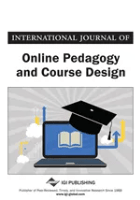
International Journal of Online Pedagogy and Course Design
Connecting theory and practice in online pedagogy.The International Journal of Online Pedagogy and Course Design, published by IGI Global, serves as a vital resource for researchers, educators, and practitioners interested in the integration of technology in education. Since its inception in 2017, this journal has focused on the latest advancements in online teaching methodologies, course design, and assessment frameworks, contributing to the dynamic field of educational technology. It is indexed in Scopus and currently ranks Q4 in the Education category, reflecting its growing influence within the academic community. The journal provides an invaluable platform for sharing innovative research and practical insights that enhance online learning experiences, crucial in today’s digitally-driven educational landscape. With an ISSN of 2155-6873 and E-ISSN of 2155-6881, the journal is dedicated to fostering a collaborative environment where ideas and practices in online pedagogy can thrive.
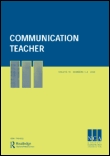
Communication Teacher
Exploring New Horizons in Communication Pedagogy.Communication Teacher, published by Taylor & Francis Ltd, is a pivotal academic journal focused on the realms of communication and education, with a strong emphasis on innovative teaching practices and pedagogical strategies. With its ISSN 1740-4622 and E-ISSN 1740-4630, the journal serves as a vital resource for scholars, educators, and practitioners seeking to enhance their understanding of communication education. Operating from the United Kingdom, it has garnered a respectable standing within its field, achieving a Q3 ranking in both Communication and Education categories as of 2023. Although currently operating without open access options, Communication Teacher continuously seeks to foster scholarly dialogue and collaboration among its community, covering a diverse range of topics aimed at improving communication skills in educational settings. Researchers and practitioners looking to stay abreast of the latest pedagogical advancements will find this journal an essential addition to their academic resources.

International Journal of Education in Mathematics Science and Technology
Fostering dialogue and collaboration for a brighter educational future.The International Journal of Education in Mathematics Science and Technology (ISSN: 2147-611X, E-ISSN: 2147-611X) is an esteemed publication dedicated to advancing knowledge and research in the fields of mathematics, science, and technology education. Published by Necmettin Erbakan University in Turkey, this journal serves as a vital platform for educators, researchers, and professionals to disseminate innovative methodologies, pedagogical strategies, and educational technologies. With a commendable Q2 ranking in both the Education and Mathematics categories for the year 2022, it clearly exemplifies its impact in these domains, boasting a Scopus rank of #19 out of 74 in Mathematics (miscellaneous) and a position in the 75th percentile. Although the journal has transitioned into open access, it remains committed to fostering a rich dialogue among scholars and practitioners dedicated to enhancing educational outcomes in mathematics and science. Researchers and educators interested in contributing to pedagogical advancements are encouraged to submit their work, thereby playing a part in influencing the future of education.
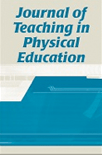
JOURNAL OF TEACHING IN PHYSICAL EDUCATION
Empowering Educators, Inspiring Students.JOURNAL OF TEACHING IN PHYSICAL EDUCATION, published by Human Kinetics Publishers Inc, stands as a premier academic journal committed to advancing knowledge and practice in the realms of physical education and related fields. With an impressive impact factor reflecting its relevance and influence in educational research, this journal boasts a distinguished classification as a Q1 journal in Education and Physical Therapy fields for 2023. Spanning from 1996 to 2024, it offers insightful contributions that engage educators, researchers, and students alike, addressing the evolving landscape of teaching methodologies and their implications for student health and fitness. The journal is accessible via traditional subscription models, providing a platform for innovative studies that aim to enhance teaching effectiveness and athletic performance. With a firm focus on interdisciplinary approaches, it plays a pivotal role in shaping future curricula in physical education and sports medicine.